21 Oct 2016 | Americas, mobile, News and features, United States
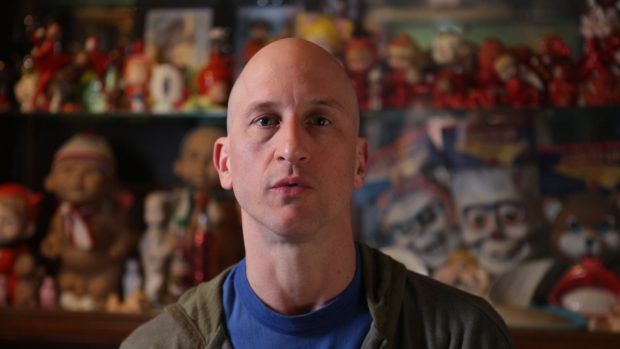
For the good of society, American cartoonist Mike Diana was jailed without bail in 1994. So ruled a jury at the Pinellas County court in Florida, taking just 90 minutes to find him guilty of obscenity following a week-long trial in March of that year.
Diana was the first – and to date, only – cartoonist to be jailed for his work in the USA.
His ordeal began when one of his Boiled Angel comics – with the stated aim of being “the most offensive zine ever made” – ended up in the hands of a law enforcement officer in California in 1991. The shocking (and often funny) depictions of sex and violence reminded him of a series of then-unsolved murders in Gainesville, Florida. He passed his suspicions on to counterparts in the Sunshine State who took a blood sample from Diana. The cartoonist was found to have had absolutely no links with the crime but prosecutor Stuart Baggish took one look at the comic “and knew right away what [he] was looking at was obscenity”.
Boiled sold only 300 copies by mail and the only issue sold in Dian’s hometown was to an undercover police officer. Although quickly released, Diana was given three years probation, ordered to pat a $3,000 fine, given 1,248 hours community service and ordered to avoid contact with minors.
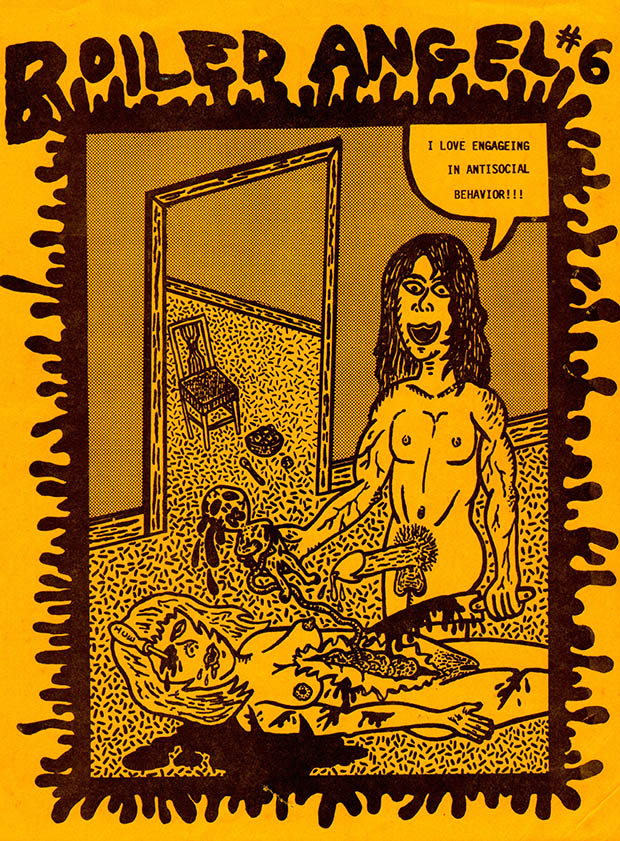
A new documentary is in the works about Diana and the limitations of the right to free speech in the face of outrage and cries of obscenity. The Trial of Mike Diana, created by cult filmmaker Frank Henenlotter, has launched a Kickstarter campaign to raise funds to finish the film and to cover the costs of a legal review typical of a project which deals heavily with the American court system.
The documentary features many of those who were there during the 1994 trial, including Baggish, as well as interviews with Diana fans and supporters Neil Gaiman, Peter Bagge and Stephen Bissette.
Diana will contribute original animation to the film.
For a medium that lends itself so well to the light-hearted, cartoons have frequently fallen victim to censors. More than two decades on from the sentencing of Diana, they still face prosecution, persecution, death threats and abuse worldwide. Last year’s attack on the offices of Charlie Hebdo was the most high-profile example of just how dangerous the medium can be.
Could history be repeated in the USA? Are the freedoms many Americans take for granted at risk? As Henenlotter puts it: “Freedom of Speech doesn’t mean anything if your art is declared ‘obscene’ and one man’s art could be another man’s obscenity. That’s the battle we explore in this documentary: an improbable collision between comic-book art and the First Amendment.”
More articles about cartoonists:
Targeted cartoonists show support for Charlie Hebdo
Malaysian cartoonist Zunar says “I will keep drawing until the last drop of my ink”
Ecuadorean cartoonist Bonil facing charges after mocking politician
Indian cartoonist arrested on sedition charges
19 Sep 2016 | Magazine, Magazine Contents, mobile, Volume 45.03 Autumn 2016
[vc_row][vc_column][vc_custom_heading text=”Does anonymity need to be defended? Contributors include Hilary Mantel, Can Dündar, Valerie Plame Wilson, Julian Baggini, Alejandro Jodorowsky and Maria Stepanova “][vc_row_inner][vc_column_inner width=”1/2”][vc_column_text]
The latest issue of Index on Censorship explores anonymity through a range of in-depth features, interviews and illustrations from around the world. The special report looks at the pros and cons of masking identities from the perspective of a variety of players, from online trolls to intelligence agencies, whistleblowers, activists, artists, journalists, bloggers and fixers.
[/vc_column_text][/vc_column_inner][vc_column_inner width=”1/2″][vc_single_image image=”78078″ img_size=”full”][/vc_column_inner][/vc_row_inner][vc_column_text]
Former CIA agent Valerie Plame Wilson writes on the damage done when her cover was blown, journalist John Lloyd looks at how terrorist attacks have affected surveillance needs worldwide, Bangladeshi blogger Ananya Azad explains why he was forced into exile after violent attacks on secular writers, philosopher Julian Baggini looks at the power of literary aliases through the ages, Edward Lucas shares The Economist’s perspective on keeping its writers unnamed, John Crace imagines a meeting at Trolls Anonymous, and Caroline Lees looks at how local journalists, or fixers, can be endangered, or even killed, when they are revealed to be working with foreign news companies. There are are also features on how Turkish artists moonlight under pseudonyms to stay safe, how Chinese artists are being forced to exhibit their works in secret, and an interview with Los Angeles street artist Skid Robot.
Outside of the themed report, this issue also has a thoughtful essay by novelist Hilary Mantel, called Blot, Erase, Delete, about the importance of committing to your words, whether you’re a student, an author, or a politician campaigner in the Brexit referendum. Andrey Arkhangelsky looks back at the last 10 years of Russian journalism, in the decade after the murder of investigative reporter Anna Politkovskaya. Uzbek writer Hamid Ismailov looks at how metaphor has taken over post-Soviet literature and prevented it tackling reality head-on. Plus there is poetry from Chilean-French director Alejandro Jodorowsky and Russian writer Maria Stepanova, plus new fiction from Turkey and Egypt, via Kaya Genç and Basma Abdel Aziz.
There is art work from Molly Crabapple, Martin Rowson, Ben Jennings, Rebel Pepper, Eva Bee, Brian John Spencer and Sam Darlow.
You can order your copy here, or take out a digital subscription via Exact Editions. Copies are also available at the BFI, the Serpentine Gallery, MagCulture, (London), News from Nowhere (Liverpool), Home (Manchester), Calton Books (Glasgow) and on Amazon. Each magazine sale helps Index on Censorship continue its fight for free expression worldwide.
Index on Censorship magazine was started in 1972 and remains the only global magazine dedicated to free expression. Past contributors include Samuel Beckett, Gabriel García Marquéz, Nadine Gordimer, Arthur Miller, Salman Rushdie, Margaret Atwood, and many more.
[/vc_column_text][/vc_column][/vc_row][vc_row][vc_column][vc_custom_heading text=”SPECIAL REPORT: THE UNNAMED” css=”.vc_custom_1483445324823{margin-right: 0px !important;margin-left: 0px !important;border-bottom-width: 1px !important;padding-top: 15px !important;padding-bottom: 15px !important;border-bottom-color: #455560 !important;border-bottom-style: solid !important;}”][vc_column_text]
Does anonymity need to be defended?
Anonymity: worth defending, by Rachael Jolley: False names can be used by the unscrupulous but the right to anonymity needs to be defended
Under the wires, by Caroline Lees : A look at local “fixers”, who help foreign correspondents on the ground, can face death threats and accusations of being spies after working for international media
Art attack, by Jemimah Steinfeld: Ai Weiwei and other artists have increased the popularity of Chinese art, but censorship has followed
Naming names, by Suhrith Parthasarathy: India has promised to crack down on online trolls, but the right to anonymity is also threatened
Secrets and spies, by Valerie Plame Wilson: The former CIA officer on why intelligence agents need to operate undercover, and on the damage done when her cover was blown in a Bush administration scandal
Undercover artist, by Jan Fox: Los Angeles street artist Skid Robot explains why his down-and-out murals never carry his real name
A meeting at Trolls Anonymous, by John Crace: A humorous sketch imagining what would happen if vicious online commentators met face to face
Whose name is on the frame? By Kaya Genç: Why artists in Turkey have adopted alter egos to hide their more political and provocative works
Spooks and sceptics, by John Lloyd: After a series of worldwide terrorist attacks, the public must decide what surveillance it is willing to accept
Privacy and encryption, by Bethany Horne: An interview with human rights researcher Jennifer Schulte on how she protects herself in the field
“I have a name”, by Ananya Azad: A Bangladeshi blogger speaks out on why he made his identity known and how this put his life in danger
The smear factor, by Rupert Myers: The power of anonymous allegations to affect democracy, justice and the political system
Stripsearch cartoon, by Martin Rowson: When a whistleblower gets caught …
Signing off, by Julian Baggini: From Kierkegaard to JK Rowling, a look at the history of literary pen names and their impact
The Snowden effect, by Charlie Smith: Three years after Edward Snowden’s mass-surveillance leaks, does the public care how they are watched?
Leave no trace, by Mark Frary: Five ways to increase your privacy when browsing online
Goodbye to the byline, by Edward Lucas: A senior editor at The Economist explains why the publication does not name its writers in print
What’s your emergency? By Jason DaPonte: How online threats can lead to armed police at your door
Yakety yak (don’t hate back), by Sean Vannata: How a social network promising anonymity for users backtracked after being banned on US campuses
[/vc_column_text][/vc_column][/vc_row][vc_row][vc_column][vc_custom_heading text=”IN FOCUS” css=”.vc_custom_1481731813613{margin-right: 0px !important;margin-left: 0px !important;border-bottom-width: 1px !important;padding-top: 15px !important;padding-bottom: 15px !important;border-bottom-color: #455560 !important;border-bottom-style: solid !important;}”][vc_column_text]
Blot, erase, delete, by Hilary Mantel: How the author found her voice and why all writers should resist the urge to change their past words
Murder in Moscow: Anna’s legacy, by Andrey Arkhangelsky: Ten years after investigative reporter Anna Politkovskaya was killed, where is Russian journalism today?
Writing in riddles, by Hamid Ismailov: Too much metaphor has restricted post-Soviet literature
Owners of our own words, by Irene Caselli: Aftermath of a brutal attack on an Argentinian newspaper
Sackings, South Africa and silence, by Natasha Joseph: What is the future for public broadcasting in southern Africa after the sackings of SABC reporters?
“Journalists must not feel alone”, by Can Dündar: An exiled Turkish editor on the need to collaborate internationally so investigations can cross borders
[/vc_column_text][/vc_column][/vc_row][vc_row][vc_column][vc_custom_heading text=”CULTURE” css=”.vc_custom_1481731777861{margin-right: 0px !important;margin-left: 0px !important;border-bottom-width: 1px !important;padding-top: 15px !important;padding-bottom: 15px !important;border-bottom-color: #455560 !important;border-bottom-style: solid !important;}”][vc_column_text]
Bottled-up messages, by Basma Abdel Aziz: A short story from Egypt about a woman feeling trapped. Interview with the author by Charlotte Bailey
Muscovite memories, by Maria Stepanova: A poem inspired by the last decade in Putin’s Russia
Silence is not golden, by Alejandro Jodorowsky: An exclusive translation of the Chilean-French film director’s poem What One Must Not Silence
Write man for the job, by Kaya Genç: A new short story about a failed writer who gets a job policing the words of dissidents in Turkey
[/vc_column_text][/vc_column][/vc_row][vc_row][vc_column][vc_custom_heading text=”COLUMNS” css=”.vc_custom_1481732124093{margin-right: 0px !important;margin-left: 0px !important;border-bottom-width: 1px !important;padding-top: 15px !important;padding-bottom: 15px !important;border-bottom-color: #455560 !important;border-bottom-style: solid !important;}”][vc_column_text]
Global view, by Jodie Ginsberg: Europe’s right-to-be-forgotten law pushed to new extremes after a Belgian court rules that individuals can force newspapers to edit archive articles
Index around the world, by
Josie Timms: Rounding up Index’s recent work, from a hip-hop conference to the latest from Mapping Media Freedom
[/vc_column_text][/vc_column][/vc_row][vc_row][vc_column][vc_custom_heading text=”END NOTE” css=”.vc_custom_1481880278935{margin-right: 0px !important;margin-left: 0px !important;border-bottom-width: 1px !important;padding-top: 15px !important;padding-bottom: 15px !important;border-bottom-color: #455560 !important;border-bottom-style: solid !important;}”][vc_column_text]
What ever happened to Luther Blissett? By Vicky Baker: How Italian activists took the name of an unsuspecting English footballer, and still use it today
[/vc_column_text][/vc_column][/vc_row][vc_row][vc_column][vc_custom_heading text=”SUBSCRIBE” css=”.vc_custom_1481736449684{margin-right: 0px !important;margin-left: 0px !important;border-bottom-width: 1px !important;padding-bottom: 15px !important;border-bottom-color: #455560 !important;border-bottom-style: solid !important;}”][vc_column_text]Index on Censorship magazine was started in 1972 and remains the only global magazine dedicated to free expression. Past contributors include Samuel Beckett, Gabriel García Marquéz, Nadine Gordimer, Arthur Miller, Salman Rushdie, Margaret Atwood, and many more.[/vc_column_text][vc_row_inner][vc_column_inner width=”1/2″][vc_single_image image=”76572″ img_size=”full”][/vc_column_inner][vc_column_inner width=”1/2″][vc_column_text]In print or online. Order a print edition here or take out a digital subscription via Exact Editions.
Copies are also available at the BFI, the Serpentine Gallery, MagCulture, (London), News from Nowhere (Liverpool), Home (Manchester), Calton Books (Glasgow) and on Amazon. Each magazine sale helps Index on Censorship continue its fight for free expression worldwide.
 SUBSCRIBE NOW[/vc_column_text][/vc_column_inner][/vc_row_inner][/vc_column][/vc_row][vc_row][vc_column][vc_basic_grid post_type=”post” max_items=”4″ element_width=”6″ grid_id=”vc_gid:1483444808560-b79f752f-ec25-7″ taxonomies=”8927″ exclude=”80882″][/vc_column][/vc_row]
SUBSCRIBE NOW[/vc_column_text][/vc_column_inner][/vc_row_inner][/vc_column][/vc_row][vc_row][vc_column][vc_basic_grid post_type=”post” max_items=”4″ element_width=”6″ grid_id=”vc_gid:1483444808560-b79f752f-ec25-7″ taxonomies=”8927″ exclude=”80882″][/vc_column][/vc_row]
4 May 2016 | Asia and Pacific, Malaysia, mobile, News and features
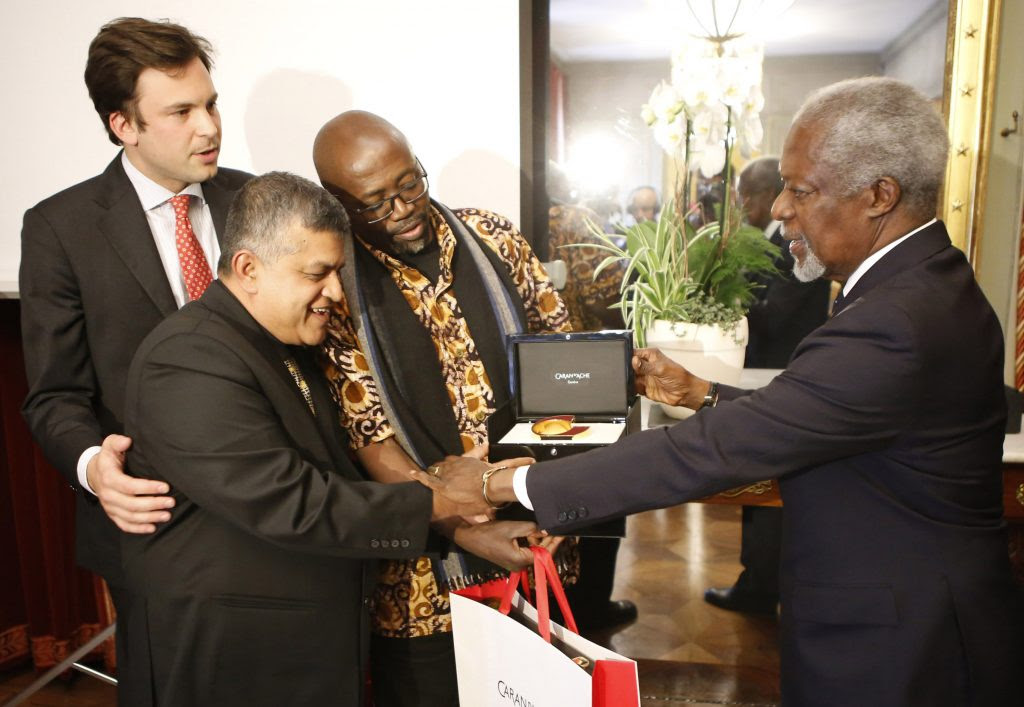
Zunar receiving the award from Kofi Annan, secretary-general of the United Nations, at the Palais Eynard, Geneva
Malaysian cartoonist Zulkiflee Anwar Haque, aka Zunar, has won the 2016 Cartooning for Peace Prize.
The award was presented at a ceremony at the Palais Eynard in Geneva on Monday 3 May 2016 by the honorary president of the Swiss Foundation Cartooning for Peace and former secretary-general of the United Nations Kofi Annan.
Annan said the award — jointly won by Kenyan cartoonist Gado — “reminds us how fragile this liberty remains in Africa and in Asia as well as in other regions of the world”.
“Through their commitment towards open and transparent societies, Gado and Zunar, who have received threats in their countries of origin and can no longer practice their profession, confront us with our responsibility to preserve freedom of expression and act in order to support the combat of those who cannot express themselves through their art,” Annan added.
Zunar has been repeatedly targeted with arrest, detention and harassment for his cartoons which are critical of corruption and abuses of power committed by the Malaysian government. He is currently facing nine charges of sedition for criticising Malaysia’s judiciary over the recent incarceration of a Malaysian opposition leader and faces a possible 43 years in prison if found guilty.
The cartoonist said the Cartooning for Peace Prize gives him “strength for me to continue the fight against the 60-year old corrupt and repressive Malaysian regime”.
He said human rights and freedom of expression are in “dire straits” in Malaysia and the country’s institutions and draconian laws such as the Sedition Act are routinely used as a tool to “silence critics” and “maintain power”.
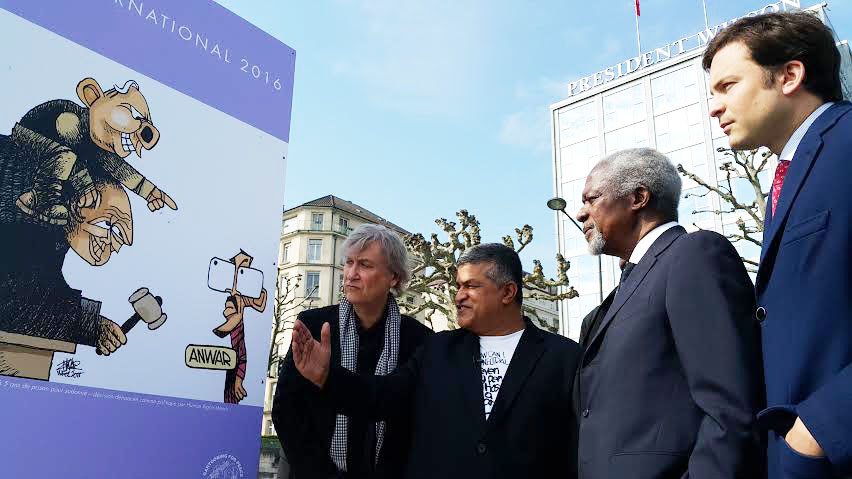
“Talent is not a gift, but a responsibility,” Zunar added. “It is a duty for me as a cartoonist to use the art as a weapon to fight unjust rulers. Fear and intimidation are the potent tools being used by the regime to scare the people.”
“I also strongly believe that, when faced with a moral crisis, there is no room to grumble in silence. We have to stand up and cry our voice out loud and clear. Neutrality is escapism for those who live in a comfort zone.”
Zunar has spent two periods in Malaysian jails, firstly in September 2010 and again from 10 February 2015. Several of his books have been banned while bookstores carrying his works have been raided and three of his assistants were arrested in October 2014 for selling his books. The webmaster, who manages his website and online bookstore, has been interrogated by Malaysian police.
Zunar has previously been awarded the 2011 Courage in Editorial Cartooning Award by Cartoonists Right Network International, the 2011 and 2015 Human Rights Watch Hellman/Hammett Award, and the 2015 International Press Freedom Award by the Committee to Protect Journalist.
Zunar received a standing ovation at Index on Censorship’s Freedom of Expression Awards in London in April.
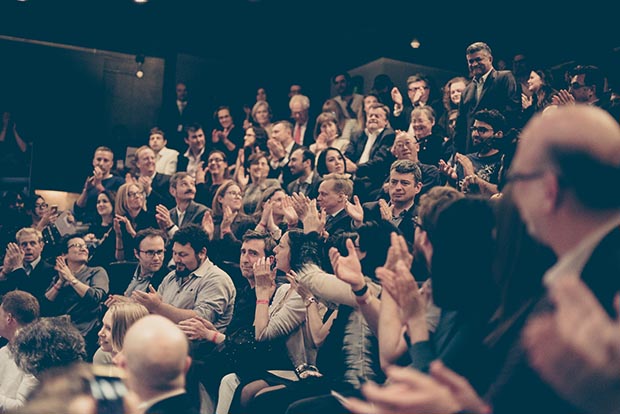
Zulkiflee Anwar Haque, aka “Zunar”, upper right, is saluted by the audience. (Photo: Elina Kansikas for Index on Censorship)
6 Nov 2015 | Asia and Pacific, Malaysia, News and features
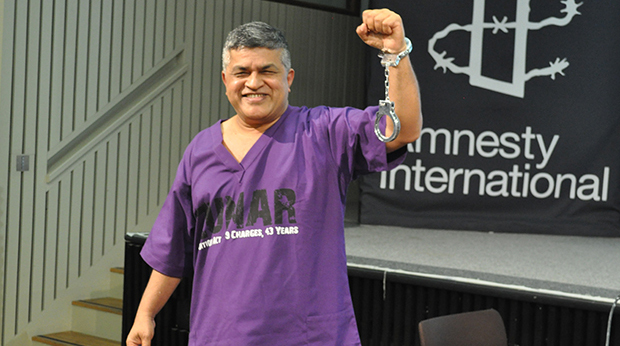
The court case against Malaysian cartoonist Zunar on nine charges of sedition was due to begin today, carrying a maximum penalty of 43 years in prison. Instead, the artist and his lawyers filed applications to have their cases referred to the high court, mounting a constitutional challenge to the country’s Sedition Act and delaying the case against them.
The charges of sedition are in relation to a series of nine tweets the cartoonist wrote in February concerning the politically charged sodomy conviction against Malaysian opposition leader Datuk Seri Anwar Ibrahim.
Zunar’s lawyer, Eric Paulsen, who was also due to face charges of sedition this morning, says the Sessions Court, which was due to hear the case, does not have jurisdiction to do so. He has posed the following three points for consideration by the court:
1 Whether section 3(3) of the Sedition Act 1948 is unconstitutional as it states that the “intention” of the maker “shall be deemed to be irrelevant” when making the seditious statement;
2 Whether the Sedition Act unlawfully criminalises peaceful expression of free speech and is thus unconstitutional;
3 The recent Federal Court case in PP v Azmi Sharom misread the constitution and should be reconsidered. Under Article 10(2), “Parliament may by law impose” restrictions on fundamental rights. Therefore, as the Sedition Act pre-dates the Constitution, it cannot be read into Article 10(2) to restrict freedom of speech.
The Malaysian Federal Court dismissed a similar constitutional challenge against the Sedition Act by University of Malaya law lecturer Dr Azmi Sharom early last month. Zunar’s application is now fixed for a hearing on 8 December, and the decision will be made on 15 December.
In the meantime, there are no trial dates set for the sedition case against Zunar and his lawyers.
Zunar has just returned to Malaysia, after visiting the UK to raise awareness of his case and mount an exhibition of his work at London’s Cartoon Museum.






